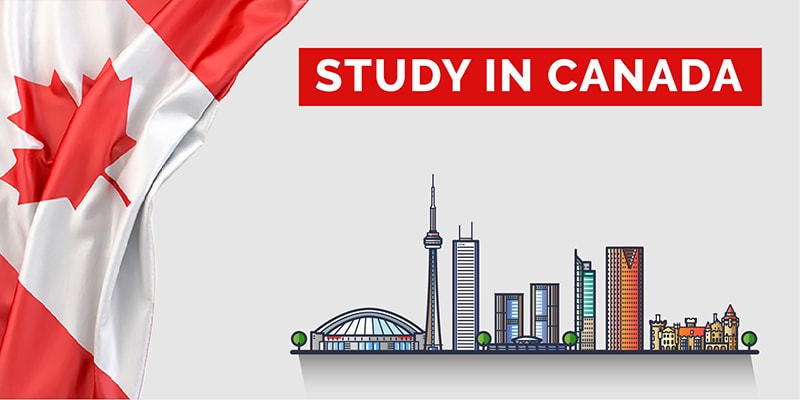Study in Canada
Studying in Canada offers a diverse and high-quality educational experience. Here's a comprehensive guide to studying in Canada, covering various aspects:
1. Why Study in Canada?
- High-Quality Education: Canada is known for its strong educational system, with many universities and colleges ranked among the best globally.
- Diverse Environment: Canada is culturally diverse, with a welcoming atmosphere for international students.
- Safety: It is considered one of the safest countries in the world.
- Post-Graduation Work Opportunities: Canada offers various pathways for international students to work after graduation.
2. Top Universities and Colleges
- Universities: University of Toronto, University of British Columbia (UBC), McGill University, University of Alberta, University of Waterloo.
- Colleges: George Brown College, Humber College, Seneca College, Sheridan College.
3. Admission Requirements
- Undergraduate Programs: High school diploma or equivalent, specific course prerequisites, English language proficiency (e.g., IELTS or TOEFL scores), and sometimes standardized test scores (e.g., SAT or ACT).
- Postgraduate Programs: Bachelor’s degree or equivalent, relevant work experience (for some programs), GRE/GMAT scores (for certain programs), and English language proficiency.
- International Students: Must also provide proof of sufficient funds, a study permit application, and sometimes additional documentation based on their home country.
4. Cost of Education
- Undergraduate Programs: Approximately CAD 7,000 to CAD 29,000 per year for domestic students and CAD 29,000 to CAD 55,000 for international students.
- Postgraduate Programs: Generally between CAD 7,000 and CAD 29,000 per year for domestic students and CAD 15,000 to CAD 55,000 for international students.
- Additional Costs: Include books, supplies, accommodation, and living expenses.
5. Scholarships and Financial Aid
- University Scholarships: Many universities offer scholarships based on academic merit, financial need, or specific criteria.
- Government Scholarships: Programs such as the Vanier Canada Graduate Scholarships and Canadian Commonwealth Scholarship Program.
- External Scholarships: Offered by organizations such as the Canadian Commonwealth Scholarship Program, and private foundations.
- Bursaries and Grants: Available from various sources for both domestic and international students.
6. Student Visa and Study Permit
- Study Permit: Required for international students. Application involves providing proof of acceptance into a designated learning institution, proof of sufficient funds, and a medical exam if required.
- Application Process: Apply online or through a Canadian embassy/consulate. Processing times vary based on the country of origin.
7. Accommodation Options
- On-Campus Housing: Available at most universities and colleges.
- Off-Campus Housing: Includes apartments, shared houses, and homestays. Universities often provide resources to help students find accommodation.
8. Work Opportunities
- On-Campus Work: Students can work up to 20 hours per week during the academic year and full-time during breaks.
- Off-Campus Work: Available to students with a valid study permit. Limits are generally up to 20 hours per week during academic sessions and full-time during scheduled breaks.
- Post-Graduation Work Permit: Allows graduates to work in Canada for up to three years, depending on the length of the study program.
9. Healthcare
- Health Insurance: International students may need to purchase health insurance, depending on the province. Some provinces offer health coverage for international students.
10. Cultural and Extracurricular Activities
- Student Life: Includes various clubs, sports, and cultural events. Universities offer numerous opportunities for personal development and networking.
- Cultural Diversity: Canada’s multicultural environment offers rich experiences and opportunities to interact with people from diverse backgrounds.
11. Climate and Weather
- Varied Climate: Ranges from temperate on the west coast to cold, snowy winters in central and eastern regions. Dress appropriately for the climate of your chosen city.
12. Application Process
- Research Programs: Identify programs and universities that match your interests and qualifications.
- Prepare Documents: Gather transcripts, letters of recommendation, standardized test scores, and language proficiency test results.
- Apply: Follow the application procedures of each institution, including deadlines and requirements.
13. Post-Graduation Options
- Work Permits: Explore work permit options to gain experience in Canada after graduation.
- Further Studies: Consider pursuing further studies or research opportunities.
Studying in Canada can provide an excellent education and a rewarding experience in a diverse and welcoming country. Be sure to research specific requirements and opportunities related to your field of study and personal interests.
